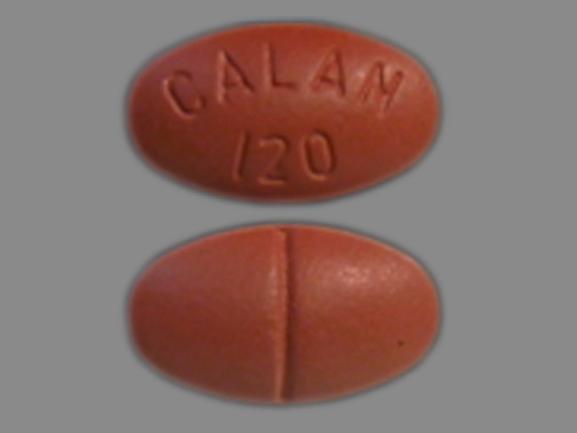Calan Dosage
Generic name: VERAPAMIL HYDROCHLORIDE 80mg
Dosage form: tablet, film coated
Drug classes: Calcium channel blocking agents, Group IV antiarrhythmics
Medically reviewed by Drugs.com. Last updated on Dec 7, 2023.
The dose of verapamil must be individualized by titration. The usefulness and safety of dosages exceeding 480 mg/day have not been established; therefore, this daily dosage should not be exceeded. Since the half-life of verapamil increases during chronic dosing, maximum response may be delayed.
Angina
Clinical trials show that the usual dose is 80 mg to 120 mg three times a day. However, 40 mg three times a day may be warranted in patients who may have an increased response to verapamil (eg, decreased hepatic function, elderly, etc). Upward titration should be based on therapeutic efficacy and safety evaluated approximately eight hours after dosing. Dosage may be increased at daily (eg, patients with unstable angina) or weekly intervals until optimum clinical response is obtained.
Arrhythmias
The dosage in digitalized patients with chronic atrial fibrillation (see PRECAUTIONS) ranges from 240 to 320 mg/day in divided (t.i.d. or q.i.d.) doses. The dosage for prophylaxis of PSVT (non-digitalized patients) ranges from 240 to 480 mg/day in divided (t.i.d. or q.i.d.) doses. In general, maximum effects for any given dosage will be apparent during the first 48 hours of therapy.
Essential hypertension
Dose should be individualized by titration. The usual initial monotherapy dose in clinical trials was 80 mg three times a day (240 mg/day). Daily dosages of 360 and 480 mg have been used but there is no evidence that dosages beyond 360 mg provided added effect. Consideration should be given to beginning titration at 40 mg three times per day in patients who might respond to lower doses, such as the elderly or people of small stature. The antihypertensive effects of CALAN are evident within the first week of therapy. Upward titration should be based on therapeutic efficacy, assessed at the end of the dosing interval.
More about Calan (verapamil)
- Check interactions
- Compare alternatives
- Reviews (4)
- Drug images
- Side effects
- During pregnancy
- Drug class: calcium channel blocking agents
- Breastfeeding
Patient resources
Other brands
Verelan, Isoptin SR, Covera-HS, Verelan PM
Professional resources
Other brands
Other formulations
Related treatment guides
Further information
Always consult your healthcare provider to ensure the information displayed on this page applies to your personal circumstances.

